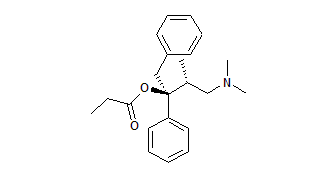Darvon
Dextropropoxyphene is an analgesic in the opioid category. It is used to treat mild to moderate pain and as an antitussive. It can be used to ease pain before, during and after an operation. It is often combined with acetominophen in the preparation co-proxamol(Darvocet in the US). more...
It is an optical isomer of Levopropoxyphene. The racemic mixture is called Propoxyphene.
Some preparations that contain dextropoxyphene include: Distalgesic and Doloxene.
The therapeutic index of dextropoxyphene is relatively small. In the UK, dextropoxyphene and co-proxamol are now discouraged from general use. Since 2004 preparations containing only dextropropoxyphene have been discontinued.
In the United States, dextropropoxyphene HCl is available as a prescription with acetaminophen in ratio anywhere from 30mg / 600mg to 60mg / 325mg, respectively. These are usually named "Darvocet," "Darvin," or "Darvon." Dextropropoxyphene is subject to some controversy: while many physicians prescribe it for a wide range of mildly to moderately painful symptoms as well as in treatment of diarrhoea, many others refuse to prescribe it, citing its highly addictive nature and limited effectiveness (some studies show it to be no more effective as a painkiller than aspirin).
Darvocet overdose is commonly broken into two categories: acetaminophen toxicity and dextropropoxyphene overdose. Many users experience toxic effects from the acetaminophen in pursuit of the endlessly-increasing dose required to achieve euphoria. They suffer acute liver toxicity, which causes severe stomach pain, nausea, and vomiting (all of which are increased by light or stimulation of the sense of sight).
Other users experience longer-term problems from consistent use of abusively high dextropropoxyphene levels. They take anywhere from 240 to 420 milligrams of dextropropoxyphene (and the acetaminophen that goes with it) in search of an increasingly elusive feeling of euphoria. These users often suffer a constantly dry mouth, decreased appetite, urinary retention and constipation. Because tolerance to dextropropoxyphene increases so quickly and because of its strong constipating effects, many people suffer a gruesome and painful rupture in the colon.
Read more at Wikipedia.org



